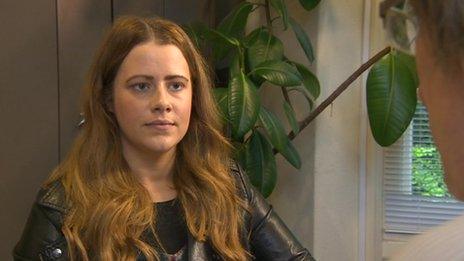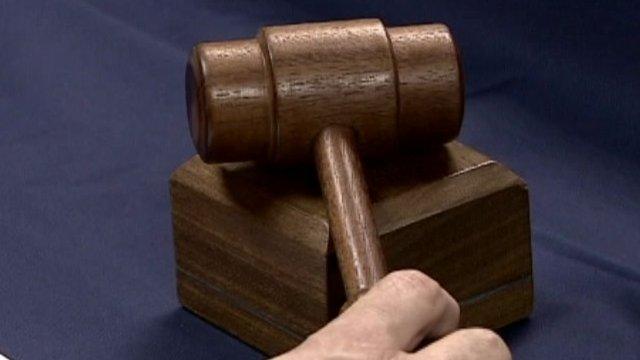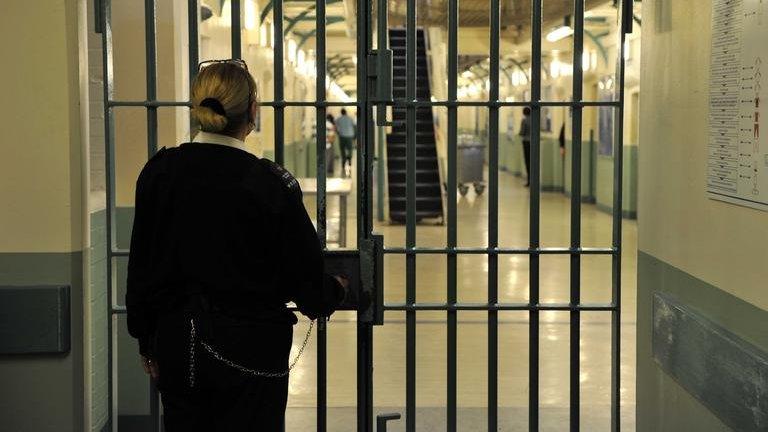Miscarriage of justice fears over legal aid cut plans
- Published
- comments

Faye Henry needed the help of a legal aid solicitor when she was wrongly accused
Student Faye Henry never imagined she'd need legal aid from a solicitor.
But when she was wrongly accused of assault last year, she knew she needed professional help.
A conviction would see her lose her job and end her hopes of becoming a nurse.
Funded defence
She turned to her local Middlesbrough firm Appleby, Hope and Matthews.
Legal aid payments funded her defence and last week she was acquitted.
She said: "It was absolutely horrendous, I wouldn't wish it on my worst enemy - the anxiety and the stress on myself and my family.
"My mind was set on choosing someone from the firm because I knew they were good.
"They really did put everything into the court case to make sure the truth came out, so I could go on to be a nurse and finish my degree."

Lawyers believe the changes to legal aid will undermine our justice system
But Faye could be one of the last able to choose her own solicitor.
The government is planning a big shake-up of legal aid.
In the future, companies will have to compete for a limited number of legal aid contracts.
So instead of clients getting their choice of lawyer, they'll be allocated one from a rota of contracted firms.
That's causing real concern amongst lawyers who say it undermines one of the key principles of our justice system.
Bill too high
But it's not the only change planned.
The government says the annual criminal legal aid bill of £1bn is far too high, and it wants to shave £220m off it.
People with an annual household disposable income of more than £37,500 will lose any entitlement to legal aid.
And under the new contracts, legal aid fees will be cut by 17.5% in most cases, 30% in some.
Firms like the one who helped Faye Henry fear that will force them out of business.
Simon Walker, a partner with Appleby, Hope and Matthews, said: "I'll be going, as well as most of my colleagues, that's for certain.
"These proposals are not survivable for the vast majority of the legal profession in this country.
"If these measures come in, our country's position at the forefront of legal reputation will disappear overnight."
New players
But what might replace the traditional local solicitors' firm?
The contracts could attract new players into the market. Some have talked about security firm G4S as a possible bidder, while a branch of haulier Eddie Stobart has already confirmed it will look for contracts.
Stobart Barristers believes it can help the government cut the bill by being more efficient than small solicitors' firms.
But existing lawyers are concerned that the changes will put profit rather than justice at the heart of legal aid, especially as lawyers will be paid the same fee regardless of a guilty or not guilty plea.
Barrister Jason Pitter, from New Park Court chambers who practises in Leeds and Newcastle, said: "We know the levels of remuneration will be driven so low that people will not be able to spend the time they currently do to go that extra length to make sure people are properly represented.
"The result inevitably will be more miscarriages of justice."
Quality guarantees
The government though rejects those criticisms.
It says there will still be quality guarantees to ensure people are properly represented.
But it insists the legal aid bill has to be cut. It says one case alone last year cost the public purse £8.5m.
Justice Secretary Chris Grayling said: "I have to find the right balance between a system that's delivering justice, making sure everyone charged with an offence has lawyers to defend them, and at the same time bringing down costs so that we can spend money elsewhere.
"If it's a choice between spending more on the health service, or spending more on the legal system, I think most people would say I want the health service."
The plans though are going to be scrutinised by MPs on the Commons Justice Committee.
One of the members is Middlesbrough's Labour MP Andy McDonald, and he's already concerned about their impact.
He said: "These proposals as they currently stand are going to transform legal aid and there are real concerns about access to justice and about freedom of choice.
"It seems peculiar that we seem so insistent about choice in health and education, but here it seems to be about doing away with choice."
A consultation on those plans is about to end, but lawyers say the government refuses to listen to their concerns.
Hundreds of them have already marched through Westminster in protest, but now they are aiming to get the public on side.
Cutting the cost of justice will certainly hit them in the pocket, but they insist that it will be the likes of you and me who will pay the heaviest price if - like Faye Henry - we suddenly find ourselves needing legal aid and a solicitor.
- Published21 May 2013

- Published21 May 2013

- Published9 April 2013
